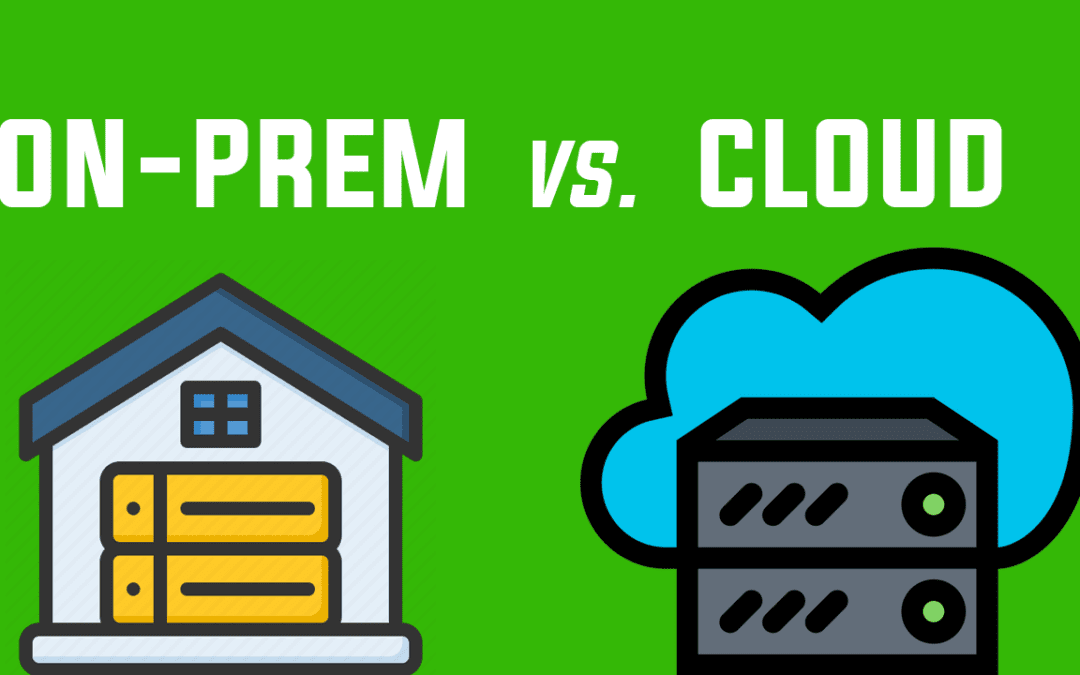Data is the lifeblood of modern businesses, making data storage, back-up and recovery crucial components of any business’s IT strategy.
When it comes to data storage, there are two primary options: on premise or on-site storage and cloud-based storage.
Almost 70% of small businesses close within a year of a large data loss. (Consoltech)
On-Prem (On-Site) Data Storage
On-prem data storage refers to the storing of data on physical devices, such as servers, hard drives, or tapes that are located on your business premises.
The primary benefit of on-prem data storage is that you have direct control over your data, including security and accessibility.
On-prem data storage, however, can be vulnerable to physical damage such as fire or flood or theft.
Every five years, 20% of small and medium-sized businesses suffer from data loss due to a major disaster. (webtribunal.com)
Cloud-Based Data Storage
Cloud-based data storage, on the other hand, refers to storing data in a remote location that’s accessible over the internet. This could include public cloud-based storage solutions like Google Drive or Dropbox, or private cloud-based solutions offered by cloud service providers such as Amazon or Microsoft.
The primary benefit of cloud-based storage is that your data is protected from physical damage or theft, as it’s stored in a secure, remote location.
A study by IDC found that the global market for cloud storage is expected to grow from $48.9 billion in 2020 to $297.5 billion by 2027, highlighting the increasing popularity of cloud-based storage solutions.
Cloud-based storage also offers the benefit of easy access from anywhere, as long as you have an internet connection. This makes it a particularly viable choice for businesses with remote workers or users who need access outside of the office.

Data Loss and Data Recovery
Data loss can happen for a variety of reasons, including hardware failure, cyberattacks, employee mistakes, and natural disasters. Data back-ups, therefore, become critical to the success of any data recovery solutions.
On-prem backup solutions typically involve creating backups of your data on physical devices, such as external hard drives or tape drives. Cloud-based backup solutions, on the other hand, involve creating backups of your data in a remote location that is managed by a third-party provider.
With on-prem data systems data recovery can be problematic. In the case of disasters such as fire, floor, or theft, the data is often destroyed and cannot be recovered.
According to a recent study by the Ponemon Institute, 67% of data breaches were caused by human error or system glitches.
With cloud-based recovery solutions, you can typically recover data quickly because your data is backed up to the cloud on a regular basis, and can be restored from the cloud with minimal downtime.
96% of businesses don’t back up their workstations. (webtribunal.com)
Comparing the Costs
When it comes to cost considerations, cloud-based storage is usually more cost-effective than on-prem storage. Cloud-based storage typically requires less upfront investment in hardware and infrastructure. Instead, you pay for the storage space you need on a monthly or yearly basis. Additionally, cloud-based storage can be scaled up or down as your business needs change, so you don’t need to worry about investing in storage space you may not need.
On-prem storage requires a larger upfront investment in hardware and infrastructure, and you’ll need to budget for ongoing maintenance and upgrades. On-site storage can be less flexible than cloud-based storage, as you’ll need to invest in additional hardware if you need more storage space.
Comparing the top cloud services providers
Currently, the top cloud services providers in terms of size and market share are:
1. Amazon Web Services (AWS)
2. Microsoft Azure
3. Google Cloud Platform
4. Alibaba Cloud
5. Salesforce
6. IBM
7. Digital Ocean
AWS is widely regarded as the largest and most mature cloud service provider, with a comprehensive suite of cloud services that span computing, storage, and networking. AWS offers services such as Amazon EC2 for computing, Amazon S3 for storage, and Amazon RDS for database management.
Microsoft Azure allows users to build, deploy, and manage applications and services through a global network of data centers. Azure provides a broad range of services including compute, storage, and networking, as well as specialized services for big data, analytics, and machine learning.
33% of all folders in an average company are not protected at all. (Comparitech)
Google Cloud Platform is a suite of cloud computing services offered by Google that provides access to a range of services including compute, storage, networking, and data analytics. Google Cloud Platform offers services such as Google Compute Engine for computing, Google Cloud Storage for storage, and Google BigQuery for data analytics.
AWS has the most extensive range of cloud services and the most mature ecosystem of third-party tools and services. Azure is well-suited for businesses that use Microsoft technologies and applications, and provides strong support for hybrid cloud environments. Google Cloud Platform is known for its powerful data analytics capabilities and its focus on machine learning and artificial intelligence.
Choosing the Right Data Storage and Back-up Solution
Ultimately, the right data storage solution for your business will depend on a variety of factors, including your budget, security needs, business needs, and storage requirements. The key is to ensure that your backups are done regularly, ideally on a daily basis, and that you have a plan in place for restoring your data in the event of a loss.
75% of small businesses lack a disaster recovery plan. (webtribunal.com)
A knowledgeable IT partner can help you evaluate your options and make the best choice for your business. They can also assist with implementing a backup and recovery plan to ensure your data is secure and protected.
By taking a proactive approach to data storage and backups, you can help to ensure the long-term success and stability of your business.

